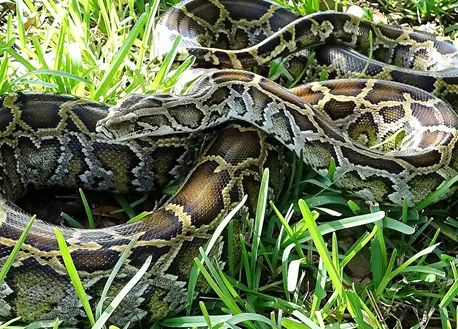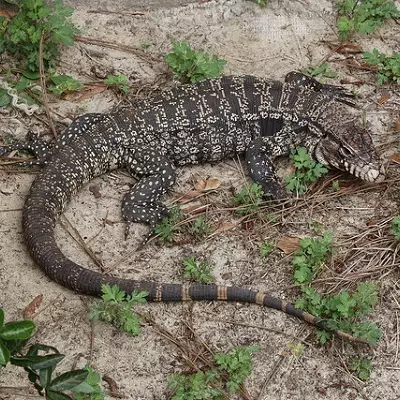The Ecological Menace of Invasive Reptiles
- Mar 19, 2025
- 3 min read
Florida leads the world in the number of introduced reptile and amphibian species, with non-native lizards now outnumbering native ones. These invasive species have wreaked havoc on local ecosystems, often outcompeting, preying upon, or transmitting diseases to indigenous wildlife. The Burmese python, for instance, has established a significant presence in southern Florida, leading to severe declines—ranging from 80% to 100%—in populations of previously common mammals such as raccoons, opossums, and rabbits. There are also at least 50 species of non-native lizards present in Florida. Some of the most notorious include green iguanas, black tegus and rock agamas, which all damage native habitats and plants.
The method of arrival for invasive reptiles to Florida can vary but the vast majority originate from the pet trade. Over time, whether through intentional releases by overwhelmed pet owners or accidental escapes, these non-native reptiles found their way into the wild, where they have thrived at the expense of native flora and fauna. Common sense would indicate that Florida should want to move toward a total ban on the exotic pet trade given the damage that has already occurred, is ongoing and only has the potential to get worse but it's not that simple.
As Always, Follow the Money
The exotic pet trade is a multi-million-dollar industry in Florida. Reptile breeding and sales provide income for breeders, retailers, and trade show organizers. Many argue that an outright ban would negatively impact small businesses and the broader pet industry. For this reason, efforts to ban or heavily regulate the trade of exotic species often face opposition from industry groups, lobbyists, and reptile enthusiasts. These groups argue that responsible ownership should be encouraged rather than a complete prohibition.
Speak Up
Now, the Florida Fish and Wildlife Conservation Commission (FWC) is seeking public feedback from all on proposed rule change concepts relating to nonnative species by holding a series of virtual meetings in the coming weeks. According to FWC, topics discussed will include qualifications for permits to sell green iguanas collected from the wild in Florida, transfer of Prohibited species sales permits, transfer allowances for captured green iguanas, and batch marking wild-caught green iguanas. Other proposed changes that will be discussed include Prohibited species pet permit renewals, caging requirements for juvenile green iguanas or tegus, options for FWC Law Enforcement placement of Prohibited species, and clarification on disallowing importation of Conditional or Prohibited species into Florida for personal use.
The first series of virtual public meetings will cover permit qualifications for sales of wild-caught green iguanas, transfer of sales permits, transfer allowances for captured green iguanas, and batch marking of green iguanas.
Tuesday, March 25, 10 a.m. – 12 p.m. EST
Wednesday, March 26, 6-8 p.m. EST
Saturday, March 29, 1-3 p.m. EST
The second series of virtual public meetings will cover renewals of Prohibited species pet permits, caging requirements for juvenile tegus and green iguanas, placement options for Prohibited species by FWC Law Enforcement, and clarification on importation of Conditional and Prohibited species for personal use.
Thursday, March 27, 1-3 p.m. EST
Thursday, March 27, 6-8 p.m. EST
Saturday, March 29, 10 a.m. – 12 p.m. EST
How to Attend
The meetings will be held via Zoom and each meeting's zoom link may be found here:
Please note that each of the three meeting times in both series will host identical content so it's not necessary to attend more than one time for each series (two meetings).
If you are unable to attend a zoom meeting, you can fill out a comment form HERE or send feedback to FWC via email at this address: NonnativeSpeciesRules@MyFWC.com




